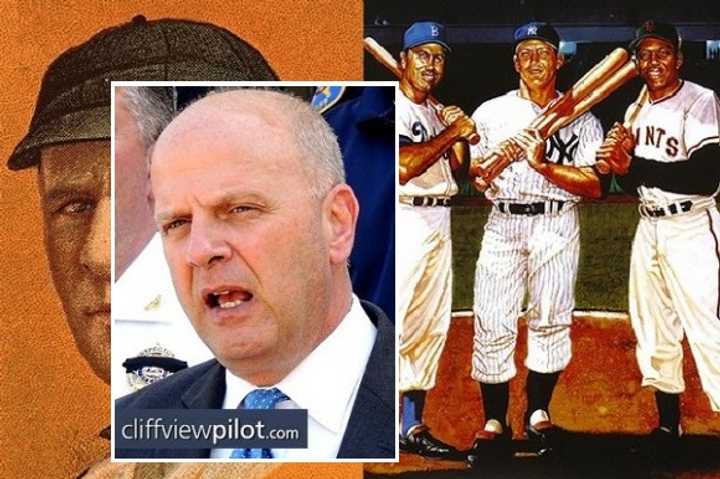“Our investigation did not uncover anything that rose to the level of criminality,” the AG’s Office wrote in an email published yesterday by PIX11.
Consumer reporter Howard Thompson argued in his report that there was “no evidence” that a state probe “even happened” (SEE: NJ’s Attorney General closes case of fraudulent memorabilia).
As proof, he said, investigators didn’t speak with any of the people he interviewed on camera for his original story (SEE: Bergen County prosecutor used false document to sell bogus memorabilia).
“They didn’t investigate anything,” Thompson was told by Bill Brennan, a former councilman-turned-gadfly from Wayne who has filed complaints against various public and private agencies, officials and administrators in New Jersey over the past decade and a half.
Molinelli responded to the original PIX11 report by reaching out directly and offering refunds to any of those customers who bought $36,835 worth of memorabilia from William Stracher’s collection sold by Caspert Auctioneers of Englewood Cliffs for his office on May 3 and Sept. 27.
Even though buyers are told in writing that no guarantees or warranties are made — and that government agencies aren’t bound by experts’ opinions — Molinelli said he wanted the public to have confidence in his office and not have its reputation tarnished in any way.
“The right thing here is to make sure that you have confidence in our office, regardless of the fact that we still believe that the signed item which you purchased is based upon a valid certificate,” Molinelli wrote in a five-page letter to more than two dozen buyers in December (SEE: Bergen prosecutor calls TV station fake baseball memorabilia report ‘shoddy, irresponsible,’ offers refunds).
Those who accepted his offer included John Slokovitz and his wife, Mary, who told Thompson that they were happy to get more than $2,300 back for what turned out to be worthless items.
However, they said they were also “hurt” do discover that the state probe was closed after they “never heard” from investigators.
Molinelli’s detectives seized the collectibles from Stracher at his Vermont home eight years ago while charging him with illegally peddling prescription drugs from his Paterson pharmacy.
Stracher laundered his ill-gotten gains by buying up huge amounts of collectibles, some of them autographed, the prosecutor said. He then arranged to have them sold by Robert Lifson and his company, Robert Edward Auctions (REA).
Lifson, in turn, hired James Spence Authentication (JSA) to examine 41,678 items for authenticity.
Spence split the collection, taking what he deemed genuine to auction and leaving behind in Vermont what he considered fakes, as well as items that he said weren’t worth assessing.
Authorities later arrested Stracher there in November 2007, seizing the remaining pieces.
In court papers, Lifson said all of those items, except for one, were “not genuine and had no value.”
Molinelli hired his own expert to determine whether any or all of the items that Lifson examined were, in fact, bogus. He found his man on the History Channel program “Pawn Stars” — Las Vegas-based authenticator Drew Max.
The Bergen County Chosen Board of Freeholders awarded a $10,000 contract to Max on Molinelli’s word that he couldn’t find another suitable authenticator.
Thompson, in his report, quoted another expert saying that he’d have taken the job — and met all of the specfications — for half of Max’s price. Two more experts whom Molinelli said he spoke with gave differing accounts in Thompson’s report from the prosecutor’s claims.
Thompson also interviewed people who questioned Max’s reliability. He cited six major sports memorabilia auction houses that he said don’t accept Max’s certificates of authenticity as a basis for auctioning items.
Thompson zeroed in on items autographed by Mickey Mantle, Ted Williams and Joe DiMaggio, the great baseball-collectible trio.
He got opinions from two companies — including Spence’s JSA.
Spence — who had examined Stracher’s items years earlier and found them wanting — this time deemed a Mickey Mantle baseball and a Ted Williams ball “non-authentic,” sayng they came from a large forgery ring busted by the FBI in 1999.
He called the signature on a DiMaggio print genuine, however.
In the end, Thompson said, Molinelli had Lifson’s warnings about the collectibles in the court papers and still went ahead with this year’s auctions.
Thompson did note that not all sports memorabilia experts agree on authenticy and that Stracher could have obtained some of the items between the time Spence did the initial authentication for Lifson and the raid on his home.
“We do want to be clear. The prosecutor’s auction did include some legitimate items,” Thompson said in his report. “And even the best authenticators can make mistakes.”
Molinelli said that was too little too late. He accused Thompson of “shoddy investigation and reporting,” leading to “some disturbing misstatements and conclusions” that he called “irresponsible.”
In his letter to buyers, the prosecutor said that Thompson “made the representation that every single item sold by our office through Caspert were forgeries,” which he said was “based solely upon a statement made by REA six years ago” from JSA’s findings….To blindly accept a statement from a third party given [seven] years earlier when it was likely that the authenticator could be mistaken or might never have seen what was seized would not be responsible.”
So his office retained Max, an independent examiner who was paid “the same amount of money whether he found that every item was authentic or every item was worthless,” Molinelli said.
Max, who the prosecutor said has testified in both state and federal courts as a document and handwriting expert, declared 25% of the items genuine. These were sold at this year’s auctions, while the rest were destroyed, he said. READ MORE….
Click here to follow Daily Voice Paterson and receive free news updates.
